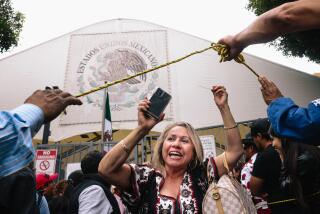Former Actor Leading in Philippine Election
MANILA — A political widow who led a popular revolution. A West Point-educated general who became a civilian politician. And now, if early exit polls prove true, a movie actor stands poised to become the third elected Philippine president since the fall of dictator Ferdinand E. Marcos in 1986.
Final results in Monday’s national elections are not expected for at least 10 days. But exit polls conducted by broadcast media here showed former actor Joseph Estrada, 61, holding a commanding lead.
An exit poll conducted by the private DZRH radio station showed Estrada leading his nine rivals for the post with 34.6% support of those interviewed. His nearest rival, House Speaker Jose de Venecia, also 61, trailed with 16.8%.
Other polls, notably one conducted by the generally pro-De Venecia Facts Base Inc., showed the race closer but with Estrada still in the lead. Most of the early exit polls were conducted in urban areas, where Estrada’s support is weakest.
As he voted Monday morning in Manila, Estrada exuded confidence. “I feel great,” he said. “It’s all over, bar the counting.” Later, as he feasted on suckling pig with supporters at his Manila home, he called his election campaign “the greatest performance of my life.”
In his quest for the presidency of this former U.S. colony with a population of 75 million, Estrada drew on parallels between his background and those of Presidents Reagan and Clinton. When opponents said his background as a movie actor was not serious, he cited Reagan’s career.
Attacked by Philippine church leaders for his history of extramarital sexual dalliances, Estrada noted that Clinton faced similar problems.
If Estrada wins, it could be a blow to the political influence of the Roman Catholic Church and its top prelate here, Cardinal Jaime Sin, who campaigned against him.
“The moral power of the church is not the same as it was in the past,” said Gerry Barican, a Manila lawyer and political columnist. “It still has some power, but it is no longer shepherds leading sheep.”
*
As usual in the Philippines’ emotional political arena, the election was accompanied by widespread reports of violence. Officials said at least seven people died in election day-related incidents, including one episode in which supporters of a mayoral candidate on remote Jolo island attacked opponents with mortars, injuring 11. Since the campaign began more than three months ago, more than 45 people have died.
Besides scattered violence, some vote counts were delayed because of power failures in rural areas.
If, as expected, Estrada--the sitting Philippine vice president who is famous for his rags-to-riches film roles--is elected, this will be the second peaceful transition here. In a 1986 snap election, Marcos and Corazon Aquino, widow of assassinated opposition leader Benigno S. Aquino Jr., declared victory. Aquino was installed as president after Marcos fled the country. In 1992, incumbent president Fidel V. Ramos won election for a single six-year term. Ramos supported House of Representatives Speaker De Venecia in Monday’s vote.
Imelda Marcos, widow of the late dictator, threw her support to Estrada after abandoning her candidacy for president. But the Marcos political tradition will continue as a result of Monday’s elections. Ferdinand Marcos Jr., son of the late dictator, was elected governor of Ilocos Norte province north of Manila. His sister, Imelda “Imee” Marcos-Manotoc, was elected to the House of Representatives from the same province.
More to Read
Sign up for Essential California
The most important California stories and recommendations in your inbox every morning.
You may occasionally receive promotional content from the Los Angeles Times.










